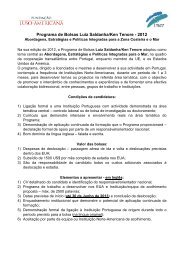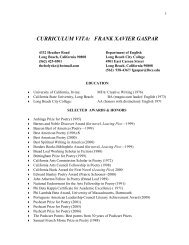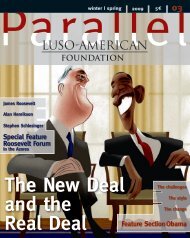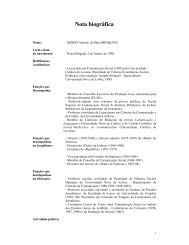Create successful ePaper yourself
Turn your PDF publications into a flip-book with our unique Google optimized e-Paper software.
III. KEY ISSUES IN NORTH-SOUTH RELATIONS<br />
North-South relations in the western Mediterranean are being<br />
driven by a number <strong>of</strong> functional issues, some new, some longstanding<br />
but rapidly evolving. As Portugal, with its European<br />
and Atlantic partners, considers priority areas for engagement<br />
across the Mediterranean, these issues will inevitably form a substantial<br />
part <strong>of</strong> the agenda 17 . Taken together, they are shaping<br />
the strategic environment facing north and south in the region.<br />
Migration and Integration<br />
For decades, analysts have anticipated large-scale<br />
migration flows from south to north across the<br />
Mediterranean, driven by stark economic disparities.<br />
The short maritime border in the western<br />
Mediterranean is the second widest economic<br />
gap in the world (the border between North and<br />
South Korea is the first) 18 . Pervasive insecurity<br />
and the perception <strong>of</strong> opportunity are potent<br />
drivers <strong>of</strong> migration across the Mediterranean.<br />
That said, migration flows in the region have not<br />
evolved in quite the way foreseen. Migration from<br />
North Africa to Europe, including southern<br />
Europe has developed in an evolutionary rather<br />
than dramatic fashion, with increasing numbers<br />
<strong>of</strong> migrants opting to remain in southern Europe,<br />
particularly Spain and Italy, rather than pressing<br />
on to northern Europe 19 . The most dramatic and<br />
challenging movements have come from the<br />
Balkans and the Adriatic, and increasingly, from<br />
17 For Portuguese<br />
perspectives on the<br />
evolving strategic<br />
environment<br />
in the Mediterranean<br />
and the Maghreb,<br />
see Luís de Medeiros<br />
Ferreira, “Portugal<br />
e a Influência<br />
Estratégica do<br />
Magrebe”,<br />
Nação e Defesa,<br />
No. 78,<br />
April-June, 1996;<br />
O Futuro do<br />
Mediterrâneo<br />
no Contexto das<br />
Relações Norte Sul<br />
(Lisbon: Ministério<br />
da Defesa Nacional,<br />
9 March 2004);<br />
and Brandão<br />
Ferreira, “História<br />
das Relações Luso-<br />
-Magrebinas:<br />
Uma Leitura<br />
Estratégica”,<br />
Jornal do Exército,<br />
No. 521, August-<br />
-September, 2003.<br />
[33]<br />
18 Andres Bassols,<br />
“The Euro-<br />
-Mediterranean<br />
Partnership”,<br />
in Andres Bassols<br />
et al., Towards<br />
a Common<br />
European-American<br />
Strategy<br />
for Democracy<br />
in the Middle East:<br />
The Role <strong>of</strong> Civil<br />
Society Institutions<br />
(Washington:<br />
Friedrich Ebert<br />
Stiftung, 2004),<br />
p. 9.<br />
19 See analyses<br />
in Maria Lucinda<br />
Fonseca and<br />
Russell King, eds.,<br />
“Migration in the<br />
Mediterranean:<br />
Bridges and<br />
Margins”,<br />
Finisterra,<br />
Vol. XXXIX,<br />
No. 77,<br />
Lisbon 2004.

















